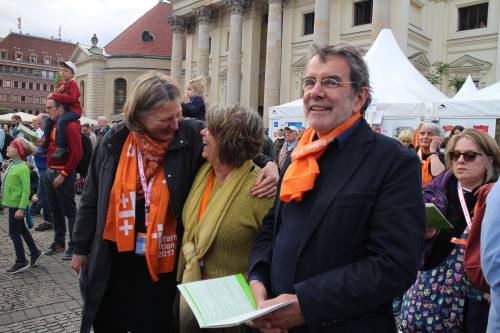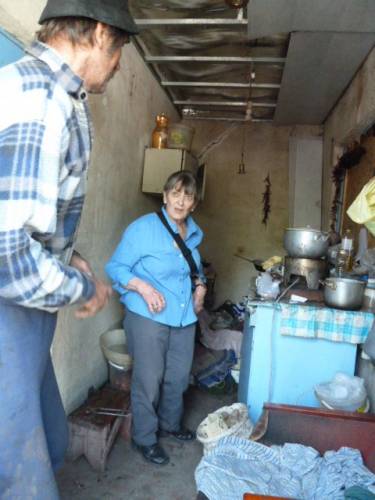A letter from Burkhard Paetzold serving in Germany
June 2017
Write to Burkhard Paetzold
Individuals: Give online to E200392 for Burkhard Paetzold’s sending and support
Congregations: Give to D506900 for Burkhard Paetzold’s sending and support
Churches are asked to send donations through your congregation’s normal receiving site (this is usually your presbytery).
(Hagar) gave this name to the LORD who spoke to her: “You are the God who sees me,” for she said, “I have now seen the One who sees me.” (Genesis 16:13)

Sara Lisherness, Laurie Kraus and Burkhard Paetzold at the German Protestant Kirchentag in Berlin. (photo: Juliane Peschel-Paetzold)
Dear friends,
Look at my orange shawl in the picture. It tells you that I was at the German Protestant Kirchentag in Berlin and Wittenberg in May, along with many, many others, among them visitors from the PC(USA).
Hagar’s “You see me” was the theme of the German Protestant Kirchentag (Church assembly) in Berlin and Wittenberg, Germany this year. South African Anglican Archbishop Thabo Makgoba, who spoke at the final worship in Wittenberg about Hagar’s “You see me” in Genesis 16:13, made the verse’s connection with today’s world very clear:
Black people …know that in so many contexts, ‘black lives do not matter.’ But as we read the Hagar story further, we find that, alongside this litany of suffering and exclusion, there is also the story of a God who acts in a powerful way. When Hagar finds herself vulnerable on the periphery, God gives her the resources to survive. Just like the Syrian refugee you have welcomed into Germany, Hagar stands as a beacon of hope to all who suffer, to the oppressed around the world. (Archbishop Makgoba’s speech in its entirety)
Kirchentag, a Christian assembly that takes place every other year in a different German city, is an expression of the dream that, as Archbishop Makgoba describes it, one day “all the narcissistic, nationalist, isolationist ramblings of our current times will disappear . . . [and] instead there will arise a global awareness that we are of one humanity.”
Kirchentag has a high VIP presence (you may know from the news that Barack Obama was there), but I believe what is most important is that it is a large movement of Christians from Germany—and more and more from Europe and overseas—who engage in faithful dialogue about the important questions of our time: justice, peace and the integrity of God’s creation.
Dialogue is so important. Today’s fragmented communication gives room for an increasing number of monologues, some of which are expressions of dominance, some of ignorance, some of narcissism and some of powerlessness.
“You see me. Do you really see me?” is a Kirchentag poster announcing a minute of silence to mourn for the thousands of refugees who have died in their attempt to cross the Mediterranean.
Where there is no relationship, there is no dialogue. When we don’t see each other like God sees us (as described in the story of Hagar), cynicism lurks around the corner.
The constant rain of information, the finger-pointing and the search for self-affirmation lead to divisions, conflict and violence. How can we break through with an eye-level dialogue?
I was proud that at the Kirchentag PC(USA) representatives Sara Lisherness and Laurie Kraus had prepared a workshop about resistance and resilience. Their program likewise focused on dialogue. This workshop sparked interest among participants from many countries, a number of them from the Global South.
In the beginning, Laurie had us discuss the following questions:
What are your greatest fears for the world?
What overwhelms you personally in your work for justice and peace?
What challenges does your communion/church face as it works for justice and peace?
When thinking about these questions, recent memories came to my mind. Some weeks ago, I went on a tour of Russia and Ukraine together with my colleagues Ellen Smith and Philip Woods, and with Sue and Carolyn, two members of PC(USA) congregations that are collaborating in the Russia Mission Network. You can read more about this trip in Ellen Smith’s recent Mission Connections letter. On this trip, we noticed again and again what happens when dialogue becomes impossible, when the idea of “making my country great again” skews the truth and overrules humanity.

Alexej in the eastern Ukrainian city of Avdiivka shows Carolyn of our group the only remaining room of his home—the kitchen.
As some we visited described it, the war in eastern Ukraine has become a forgotten war. Even though dozens of people—men, women and children—get killed almost every day, those casualties and destructions are on page three or beyond in the news. Nobody seems to listen to those suffering. Nobody seems to see them. It’s sad that when the need for dialogue among ordinary people is greatest, propaganda sometimes dominates—a reciprocity of monologues, the opposite of meaningful dialogue.
It is a war that everyone hates and nobody can win—but it still goes on. We witnessed the absurdity of that war when traveling with a church aid organization to deliver food and supplies to families in the demilitarized zone between a Ukraine-controlled area and the self-declared “Donezk Peoples Republic” ruled by Ukrainian separatists.
Many people in this buffer zone are too old or too poor to leave. Their plot of land for self-sustaining gardening or their small business is all they have.
They get used to the daily shelling from Donezk. “The shelling starts after 4 pm,” someone told us, “and when it gets worse overnight, we sleep in our basement.” We listened to people mourning dead or injured relatives and saw some standing bewildered in front of their destroyed homes, collecting the few belongings that were left or only halfway burned.
“I have raised chickens and doves,” said Alexej. “Half of them got killed in this mortar attack. My wife left this place to live with relatives. At least I still have my kitchen.” And he pointed at a shack with a little stove and some battered pots and broken plates.
It is heartbreaking. What can we do other than listen, pray, help deliver humanitarian supplies and advocate for peace? How can we help to get people (even Christians!) truly conversing with each other?
What does the lament that all our humanitarian efforts are just a “drop in the bucket” mean, besides serving as an excuse for ignorance? Imagine you are this drop. You build relationships, you are the one seeing the other (remember Hagar’s “you see me”), you try to understand. Would you really consider yourself as a drop? Wouldn’t you rather become a seed?
At the end of Sara and Laurie’s presentation at the Berlin Kirchentag, they helped us reframe their questions about fear, about being overwhelmed and about our challenges:
What is your deepest conviction about God’s intention for the world?
What resources of faith shape and inform your resistance?
How can the church strengthen its common witness to God’s reconciling activity in the world?
… and one participant of the workshop said what many were thinking: “Just raising these reframed questions is already the response we need.”
I’m wondering if we can make these questions a base for our dialogue, a dialogue that is so much needed. Do you think you can discern these questions in your communities? Honestly, I would be thrilled to be able to be a part of such discussions.
Grace and peace to you all.
Burkhard
![]() You may freely reuse and distribute this article in its entirety for non-commercial purposes in any medium. Please include author attribution, photography credits, and a link to the original article. This work is licensed under a Creative Commons Attribution-NonCommercial-NoDeratives 4.0 International License.
You may freely reuse and distribute this article in its entirety for non-commercial purposes in any medium. Please include author attribution, photography credits, and a link to the original article. This work is licensed under a Creative Commons Attribution-NonCommercial-NoDeratives 4.0 International License.